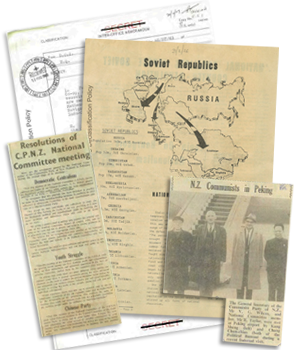 These records relate to the Communist Party of New Zealand. They date from the early 1920’s through to the 1980’s, and reflect work during this period by the NZ Police Special Branch and then the NZSIS as the successor of this work.
These records relate to the Communist Party of New Zealand. They date from the early 1920’s through to the 1980’s, and reflect work during this period by the NZ Police Special Branch and then the NZSIS as the successor of this work.
The Russian Revolution in 1917 and the subsequent seizure of power by the Bolsheviks, had worldwide ramifications. In New Zealand it saw the establishment of the Communist Party of New Zealand (CPNZ) in 1921. The CPNZ followed a pro-Russian Marxist-Leninist ideology and was formally affiliated to the COMINTERN (The Communist International) in 1928. From then until the early 1960’s the CPNZ followed the Soviet line. The party, for example, initially opposed NZ’s involvement in WWII up until 1941 when Hitler attacked the USSR at which point the party became a supporter of the war.
The CPNZ remained a faithful follower of the Communist Party Soviet Union (CPSU) notwithstanding the twin shocks of 1958 – the Soviet intervention in Hungary and the revelations at the 20th Congress of the CPSU which saw KRUSHCEV denounce STALIN. From the beginning of the 1960’s, however, the relationship between the CPNZ and the CPSU frayed. This was caused by the ideological disagreement between the Communist Party China (CPC) and the CPSU. The CPNZ came down on the side of the CPC. The party split, with those supporting the CPSU eventually establishing the Socialist Unity Party NZ (SUPNZ). The CPNZ’s contacts with the CPSU all but ceased from that time.
During this period the CPNZ had influence in the worldwide communist movement out of proportion to its small size or political impact in New Zealand. It was the only western communist party to shift its allegiance from Moscow to Beijing during the ideological dispute of the 1960’s. This meant that senior party cadres enjoyed high level access to key CPC decision makers and the party's voice had some weight on the international stage.
In 1976 the CPNZ split with the CPC on ideological grounds and instead followed the Albanian Party of Labour (Hoxhaism) as the true party of Marxism-Leninism.
In 1994 the curtain came down for the CPNZ for the final time following the collapse of communist rule in Albania. The CPNZ splintered and the remnants came to be known as the Socialist Workers Organisation.
The CPNZ was of enduring interest to the NZSIS and its predecessors, because of its avowed belief in violent revolution and rejection of democratic government which it believed only served the interests of the capitalist class.
Historically, the NZSIS was interested in countering espionage and subversion which was formally recognised in 1969 with the passing of the New Zealand Security Intelligence Service Act. The agency monitored various organisations to determine whether groups that were deemed to be subversive were attempting to exert influence over mainstream groups to further their own ends. Although small in membership, the CPNZ was influential in a number of areas including the trade unions and the peace movement.
The NZSIS’s interest in the CPNZ waned after Ombudsman Sir Guy Powles recommended in 1975 that higher priority was given to espionage and terrorism.
Records
Please note file sizes before downloading, as some are quite large.
